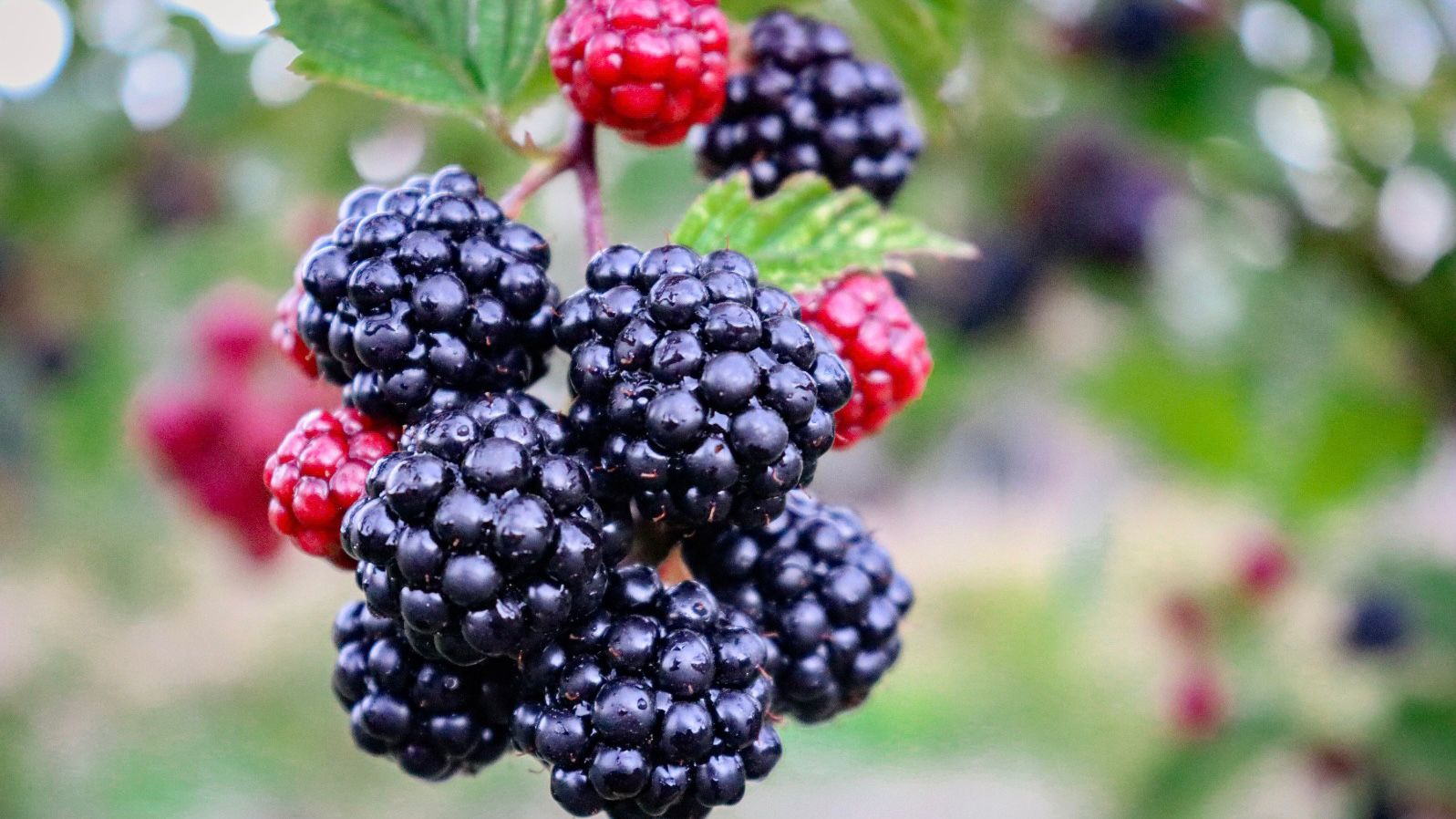
10 Tips for Growing Blackberries at Home
Blackberries are a delicious and versatile fruit that can be grown in a backyard or patio garden. These tips will help you to successfully grow blackberries at home.
Tip#1 Choose the right variety.
When choosing blackberry varieties, consider whether you want a thornless or thorny plant, as well as the type of fruit (erect or trailing). Erect varieties like ‘Chester’ and ‘Arapaho’ are thornless and produce large, firm berries, while trailing varieties like ‘Marion’ and ‘Boysen’ have thorns and produce smaller, but sweeter fruit. It’s essential to choose the right variety that will grow well in your area and suits your taste. Once you have selected the variety, make sure to buy the plants from a reputable nursery.
Additionally, it’s crucial to understand the growth habit of the variety you have chosen. Erect varieties need more space and are more suited for a backyard, while trailing varieties are more suitable for a patio or a small garden.
Tip#2 Find the right location.
Blackberries prefer full sun and well-draining soil, so choose a location that gets at least 6 hours of direct sunlight per day. They also need a lot of space, so make sure the area you choose is at least 8 feet wide and 10 feet long. Proper drainage is crucial for blackberries to grow well, so make sure the location you choose has good drainage. You can also consider raised beds for growing blackberries if the drainage in your area is poor.
Additionally, it’s essential to keep in mind that blackberries need a lot of space to grow, so make sure to provide them with enough room to spread out. If you have limited space, consider training them to grow vertically on a trellis or a wire support.
Tip#3 Plant at the right time.
Blackberries should be planted in the spring or fall, when the soil is moist and the weather is mild. This will give the plants enough time to establish a strong root system before the heat of summer or the cold of winter. Planting at the right time ensures that the blackberries get enough time to grow and establish a strong root system before the weather becomes too hot or cold.
Additionally, make sure to plant the blackberries at the same depth as they were in the nursery. Water them well after planting, and keep the soil consistently moist until they establish.
Tip#4 Provide proper care.
Blackberries need regular watering and fertilization to thrive. Water them at least once a week, and fertilize them every 4-6 weeks with a balanced fertilizer. Prune the canes in late winter or early spring to promote healthy growth. Proper care is crucial for blackberries to grow well. They need regular watering, especially during dry spells, to ensure that the soil stays consistently moist.
Additionally, fertilizing them every 4-6 weeks with a balanced fertilizer will provide them with the necessary nutrients to grow strong and produce a bountiful crop. Pruning the canes in late winter or early spring will help to promote healthy growth and prevent the plant from becoming too crowded.
Tip#5 Control pests and diseases.
Blackberries are susceptible to pests like aphids and diseases like powdery mildew. Keep an eye out for these problems and address them as soon as they appear. Use an insecticidal soap or neem oil to control pests, and make sure to provide proper air circulation to prevent disease. Pests and diseases can ruin a blackberry crop, so it’s essential to keep an eye out for them and address them as soon as they appear.
Additionally, make sure to provide proper air circulation to prevent disease, as blackberries are susceptible to powdery mildew. Good air circulation can be achieved by providing enough space between the plants, and by pruning the canes regularly to open up the center of the plant.
Tip#6 Harvest at the right time.
Blackberries are ready to harvest in late June to early July. The fruit should be fully black and plump, and should come off the bush easily. Be sure to pick the berries regularly to prevent overripe fruit from falling on the ground and attracting pests. To ensure the best flavor and quality, it’s essential to harvest blackberries at the right time.
Additionally, be sure to pick the berries regularly, as blackberries do not ripen all at once. This will prevent overripe fruit from falling on the ground and attracting pests.
Tip#7 Use organic methods.
Blackberries can be grown organically with the use of natural methods of pest and disease control. Use organic fertilizers and make sure to rotate crops to reduce the likelihood of pests and diseases. Growing blackberries organically is not only better for the environment but also for your health, as it eliminates the use of harsh chemicals on your food.
Additionally, rotating crops in your garden can help to reduce the likelihood of pests and diseases, as it disrupts the life cycle of pests and diseases that may be present in the soil.
Tip#8 Provide support.
Blackberries need support as they grow, so install trellis or wire support to keep the canes upright. This will also make it easier to harvest the fruit. Providing support for blackberries is essential as they grow, as the canes can become heavy and flop over, making it difficult to harvest the fruit.
Tip#9 Keep an eye out for wild berries.
Be on the lookout for wild blackberries in your area, as they can be invasive and can take over your garden. If you do find wild berries, remove them immediately to prevent them from spreading. Wild blackberries can be invasive and can take over your garden if left unchecked.
Additionally, it’s essential to keep an eye out for wild berries in your area, as they can cross-pollinate with your cultivated blackberries, resulting in a less desirable crop.
Tip#10 Enjoy your blackberries.
Once your blackberries are ready to harvest, enjoy them fresh or use them to make jams, jellies, pies, and other delicious treats. They can also be frozen or dried to enjoy later. Remember to share with your friends and family too. Blackberries are not only delicious but also versatile in the kitchen. Additionally, they can be frozen or dried to enjoy later, and also can be used in jams, jellies, pies and other treats, that can be shared with friends and family.
In conclusion, growing blackberries at home can be a rewarding and delicious experience. By following these tips, you can have a bountiful crop of blackberries that you can enjoy for years to come.
If you are interested in growing other fruits, check out these other articles: How to grow raspberries, How to grow dates, How to grow mango, How to grow pomegranate, How to grow pomelo, How to grow kiwi, How to grow strawberry, How to grow currants, How to grow khaki, How to grow cranberries, How to grow bananas, How to grow citrus, How to grow blueberries, How to grow pineapples, How to grow lemons.













